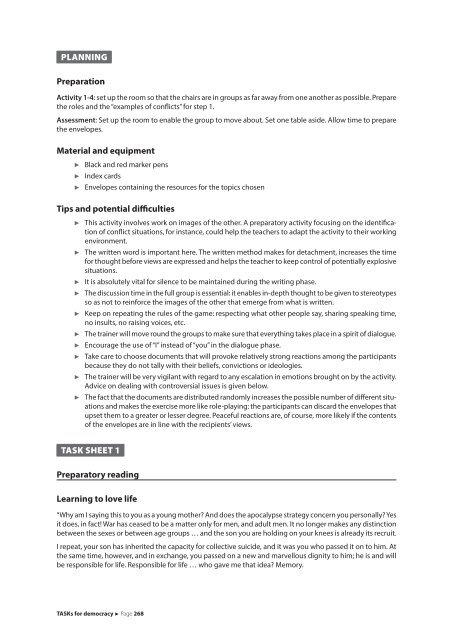TASKs for democracy
4NYw4W
4NYw4W
You also want an ePaper? Increase the reach of your titles
YUMPU automatically turns print PDFs into web optimized ePapers that Google loves.
PLANNING<br />
Preparation<br />
Activity 1-4: set up the room so that the chairs are in groups as far away from one another as possible. Prepare<br />
the roles and the “examples of conflicts” <strong>for</strong> step 1.<br />
Assessment: Set up the room to enable the group to move about. Set one table aside. Allow time to prepare<br />
the envelopes.<br />
Material and equipment<br />
<br />
<br />
<br />
Black and red marker pens<br />
Index cards<br />
Envelopes containing the resources <strong>for</strong> the topics chosen<br />
Tips and potential difficulties<br />
<br />
<br />
<br />
<br />
<br />
<br />
<br />
<br />
<br />
<br />
This activity involves work on images of the other. A preparatory activity focusing on the identification<br />
of conflict situations, <strong>for</strong> instance, could help the teachers to adapt the activity to their working<br />
environment.<br />
The written word is important here. The written method makes <strong>for</strong> detachment, increases the time<br />
<strong>for</strong> thought be<strong>for</strong>e views are expressed and helps the teacher to keep control of potentially explosive<br />
situations.<br />
It is absolutely vital <strong>for</strong> silence to be maintained during the writing phase.<br />
The discussion time in the full group is essential: it enables in-depth thought to be given to stereotypes<br />
so as not to rein<strong>for</strong>ce the images of the other that emerge from what is written.<br />
Keep on repeating the rules of the game: respecting what other people say, sharing speaking time,<br />
no insults, no raising voices, etc.<br />
The trainer will move round the groups to make sure that everything takes place in a spirit of dialogue.<br />
Encourage the use of “I” instead of “you” in the dialogue phase.<br />
Take care to choose documents that will provoke relatively strong reactions among the participants<br />
because they do not tally with their beliefs, convictions or ideologies.<br />
The trainer will be very vigilant with regard to any escalation in emotions brought on by the activity.<br />
Advice on dealing with controversial issues is given below.<br />
The fact that the documents are distributed randomly increases the possible number of different situations<br />
and makes the exercise more like role-playing: the participants can discard the envelopes that<br />
upset them to a greater or lesser degree. Peaceful reactions are, of course, more likely if the contents<br />
of the envelopes are in line with the recipients’ views.<br />
TASK SHEET 1<br />
Preparatory reading<br />
Learning to love life<br />
“Why am I saying this to you as a young mother? And does the apocalypse strategy concern you personally? Yes<br />
it does, in fact! War has ceased to be a matter only <strong>for</strong> men, and adult men. It no longer makes any distinction<br />
between the sexes or between age groups … and the son you are holding on your knees is already its recruit.<br />
I repeat, your son has inherited the capacity <strong>for</strong> collective suicide, and it was you who passed it on to him. At<br />
the same time, however, and in exchange, you passed on a new and marvellous dignity to him; he is and will<br />
be responsible <strong>for</strong> life. Responsible <strong>for</strong> life … who gave me that idea? Memory.<br />
<strong>TASKs</strong> <strong>for</strong> <strong>democracy</strong> Page 268


